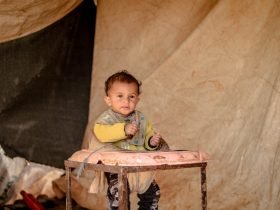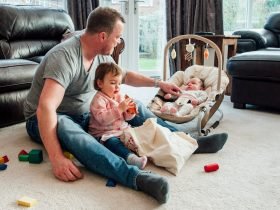Aiding Children in Coping With Mom’s Cancer

If you’re a parent who’s been diagnosed with cancer, the first bit of advice I can give you is to tell your child about it. Even though you don’t want to harm or frighten your child, your honesty will be valued over your secrecy. Try to sit down and explain things to your child at a time when there are no distractions or interruptions.
I was diagnosed with Stage II cervical cancer in 2013. I was in surgery for a radical hysterectomy to save my life within 24 hours of receiving my diagnosis. Not only did cancer take a toll on my health and mind, but it also took a toll on my family. My husband and I had a two-year-old boy at the time of my diagnosis. I couldn’t hold him or care for him while I was recovering, so I had to rely on the support of relatives and friends. It was difficult to explain these changes to our son, as well as my sluggish recovery. Since then, I’ve learnt some helpful hints for helping a youngster deal when their mother or father is diagnosed with cancer.
Describe your cancer in detail.
You should explain your diagnosis to your child after you’ve told them you have cancer. To assist your child comprehend, tell them what form of cancer you have and where it is in your body – or on the body of a toy. The more knowledge your child knows about your cancer, the better he or she will be able to comprehend it. If you don’t tell your child the truth about your disease, he or she may become more confused or anxious about it. The more your child comprehends cancer, the less perplexed and terrified they will be.
It’s possible that your child believes they can “catch” cancer.
Your youngster may be concerned that your cancer is spreadable. They may be afraid of contracting cancer themselves or of the other parent contracting it. Explain to your youngster that cancer is not the same as an ear infection or catching the flu at school. It cannot be passed from one person to another. Assure them that hugging or kissing someone with cancer will not make them sick.
Explain how your child’s life will be influenced.
Routine is beneficial to children. That is why many parents establish bedtimes and dinnertimes for their children. Schools start at the same hour every day because of routine. Your family’s routine, though, will change. It may become more difficult for you to do household tasks. You may not be able to pick up your child from school due to treatments or hospitalisation. You might not be able to attend all of their sporting events. Your child, like you, will be disappointed, but the most essential thing is to be honest with your youngster. So that your child is not surprised by change, explain how their life may be influenced.
Also, tell your youngster about the side effects of your medicine. Inform them that you may require more rest than usual or that your hair may begin to fall out. You don’t want to overburden your child with details about your cancer and treatment, but the more information they have, the less perplexing and mysterious your situation will appear to them.
It’s possible that your child is blaming themselves.
Children of all ages are prone to blaming themselves for their parents’ cancer. They may assume your sickness is a type of retribution for being ungrateful or a lousy kid. As parents, we know this is far from the case, but your child — regardless of age – may want reassurance. Explain to children that cancer is no one’s responsibility and that things happen that are beyond their control, as well as everyone else’s.
Demonstrate how they can assist.
Your youngster may feel bad for not being able to assist you in recovering sooner or better. Demonstrate how they can assist you by assisting you around the house or creating you a pleasant gift, such as a handwritten card. Make it clear to your youngster how much you appreciate what they’re doing for you.
Patience and comprehension are essential.
It is critical to be empathetic and supportive of your child. Your child may not be able to express their emotions verbally, but they can show them through their actions. Continue to be honest with your child about your condition and be patient with their behavior. Inquire about your child’s feelings and how they’re coping. Demonstrate to them that they are valuable.
It may be difficult to be a shoulder to cry on for your child while you’re undergoing treatment, but your child will benefit greatly from your support and trust. If your child is having trouble coping, offer to help them find a child psychiatrist with whom they can speak.
Following my treatment, I developed PTSD (post-traumatic stress disorder) and body dysphoria. Counseling assisted me in overcoming emotional scars and trauma. Professional psychiatry can assist your child in talking about and working through their complex emotions.
Be ready to answer tough questions.
“Is Mom (or Dad) going to die of cancer?” is a question you should be prepared to answer. Tell the truth about your diagnosis as much as you can. Tell your child you won’t die anytime soon if you haven’t been told your time is limited. Explain that people can die from cancer, but that doctors can also help them beat it. Give your child the gift of optimism and hope. To help them cope with their anxiety about your cancer, explain that they shouldn’t be concerned about the future and should instead concentrate on the present. If your child asks you a question about your cancer and you don’t know the answer, don’t be embarrassed to say “I don’t know.”
Spend time with each other.
You should spend as much time as possible with your child. You may not always be physically or mentally capable of participating in activities with them, but you should not pass up an opportunity to do so when you are. Spending time with your child will make both of you feel better and restore a sense of normalcy in your lives.
I understand that parenting while battling cancer may appear to be an impossible task, but it isn’t. Not only with your child, but also with yourself, be patient and truthful.
























Leave a Reply
View Comments